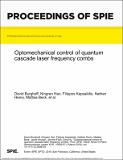Optomechanical control of quantum cascade laser frequency combs
Author(s)
Burghoff, David Patrick; Han, Ningren; Kapsalidis, Filippos; Henry, Nathan; Beck, Mattias; Khurgin, Jacob; Faist, Jerome; Hu, Qing; ... Show more Show less
DownloadPublished version (2.754Mb)
Publisher Policy
Publisher Policy
Article is made available in accordance with the publisher's policy and may be subject to US copyright law. Please refer to the publisher's site for terms of use.
Terms of use
Metadata
Show full item recordAbstract
© 2019 SPIE. Quantum cascade laser-based frequency combs have attracted much attention as of late for applications in sensing and metrology, especially as sources for chip-scale spectroscopy at mid-infrared fingerprint wavelengths. A frequency comb is a light source whose lines are evenly-spaced, and only two frequencies are needed to describe the system - the offset and the repetition rate. Because chip-scale combs have large repetition rates, for many spectroscopic applications is important to be able to change both parameters independently, without substantially changing the comb spectrum or spectral structure. Although it is possible to modulate both the offset and the repetition rate of a comb by tuning the laser current and temperature, both properties affect the laser by changing its index of refraction, and both frequencies will be affected. Here, we show that by integrating a mirror onto a MEMS comb drive, the dispersion and group delay associated with a quantum cascade comb's cavity can be modulated at kilohertz speeds. Because the MEMS mirror primarily affects the group delay of the cavity, it is able to adjust the comb's repetition rate while leaving the offset frequency mostly unaffected. Since this adjustment is linearly independent from current adjustments and can be adjusted quickly, this provides an avenue for mutual stabilization of both parameters. In addition, we show that dynamic modulation of the comb drive is able to allow the laser to recover from comb-destroying feedback, making the resulting comb considerably more robust under realistic conditions.
Date issued
2019-03-01Department
Massachusetts Institute of Technology. Department of Electrical Engineering and Computer Science; Massachusetts Institute of Technology. Research Laboratory of ElectronicsPublisher
SPIE
Citation
Burghoff, David, Han, Ningren, Kapsalidis, Filippos, Henry, Nathan, Beck, Mattias et al. 2019. "Optomechanical control of quantum cascade laser frequency combs."
Version: Final published version